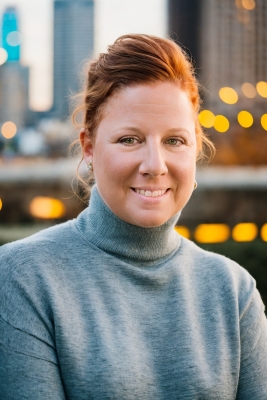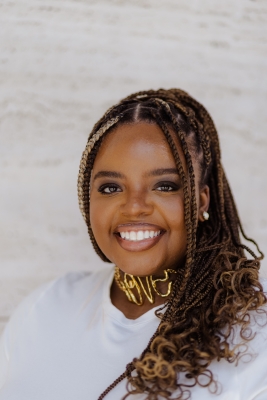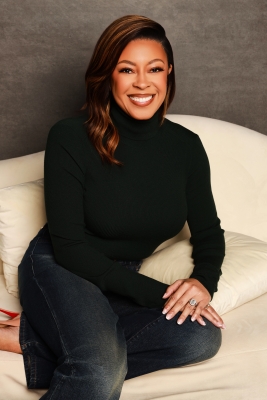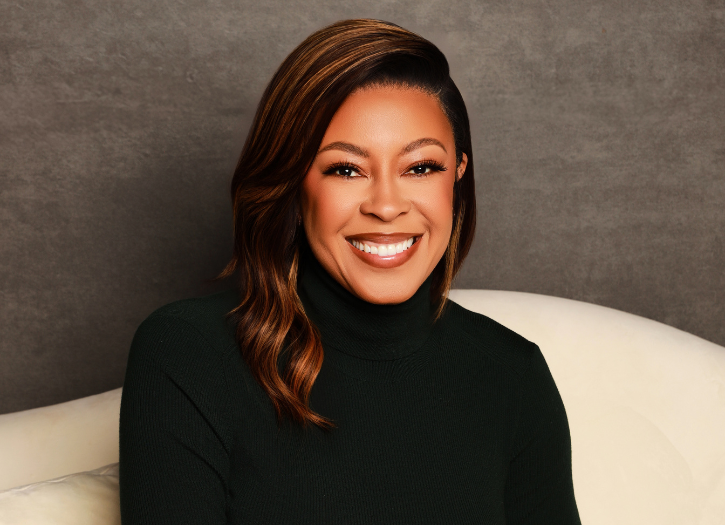In an industry often defined by fleeting trends and surface-level storytelling, NIMBUS is carving out a different kind of legacy—one rooted in purpose, cultural fluency, and unapologetically bold creativity. At the helm of this award-winning, female-led agency are Dr. Dawn Wade (Chief Strategy Officer/Managing Partner), Jennifer Ball (VP of Client Services), and Hope Smith (Director of Brand Strategy)—three powerhouse leaders who are reshaping the way brands connect with communities. With a shared commitment to authenticity, inclusion, and measurable impact, the NIMBUS team isn’t just checking boxes—they’re building campaigns that challenge the status quo and reflect the richness of real life. In this conversation, the trio opens up about the power of “Good Tension,” the responsibility of representation, and the legacy they hope to leave behind—not just as marketing experts, but as women transforming the future of media.

JENNIFER BALL, VP CLIENT SERVICES

HOPE SMITH, DIRECTOR OF BRAND STRATEGY

DR. DAWN WADE, CHIEF STRATEGY OFFICER /MANAGING PARTNER
SHEEN: Dr. Wade, your work blends high-profile campaigns with community empowerment—how do you balance brand strategy with meaningful cultural impact, and why is that balance essential to you?
Brand strategy must be fueled by cultural nuance to truly resonate with target audiences. But there’s a fine line between resonating and pandering. When we have the opportunity to create work with genuine cultural impact, we unlock the kind of synergy that allows a brand to transcend. The most powerful outcomes happen when the campaign is mutually beneficial—when both the brand and the culture win. Balancing that takes more than strategy—it takes the right people at the table, lived experience, and good intentions that are backed by action.
SHEEN: Hope, as Director of Brand Strategy, what’s your process for translating cultural insights into campaigns that resonate with today’s diverse consumer base?
I start by listening. Tapping into our own lived experiences, as well as conversations across different communities and digital spaces, is an underrated but powerful tool. It’s not just about identifying trends, it’s about understanding the why behind them. From there, my team and I translate those insights into narratives that feel authentic, inclusive, and culturally respectful. We’re intentional about honoring the voices and communities these moments come from while also knowing how to tailor our creative to what makes sense for each unique brand. It’s about reflecting real people and real culture in a way that genuinely resonates.
Sometimes, that requires tough conversations, but collaboration and what NIMBUS has coined as Good Tension always leads to a more meaningful connection with both our clients and the consumers who experience our work.
SHEEN: Jennifer, as VP of Client Services, how do you ensure that client relationships remain rooted in trust and creativity, especially when navigating bold or unconventional campaign ideas?
In the dynamic world of advertising, maintaining client relationships rooted in trust and creativity is essential, especially when NIMBUS pushes the envelope with bold or unconventional campaigns. And we do that often!
First and foremost, trust is built through transparency and consistent communication. We work hard to establish an open dialogue from the start of any project or new client relationship, setting clear expectations for campaign goals, timelines, budgets, and the creative process.
I also tend to reflect on my former client days and think about what I needed from my agency team. I pull those same things forward at NIMBUS. Regular updates, honest assessments of challenges, and early “Good Tension” conversations about potential risks create a solid foundation for all. That foundation allows us to transform bold ideas into shared victories and agency-client partnerships into long-lasting collaborations built on trust and innovation.
SHEEN: NIMBUS has been recognized by Ad Age and Adweek—what do you believe sets your agency apart from others in the industry, especially as a female-led team?
Dawn: The list of what sets NIMBUS apart from other agencies could go on and on—but at the core, our biggest differentiator is that our differences are our superpower. We create space for the best ideas to thrive by empowering everyone to be part of the solution—not just a select few. This inclusive, collaborative model doesn’t just foster creativity—it fuels better outcomes. What also sets us apart is our ability to translate business objectives into meaningful, measurable tactics. Our work doesn’t just look good—it performs. Too often, campaigns are designed to make noise in the moment but leave no room to grow. At NIMBUS, we think beyond the launch. We consider the long-term implications from the start, giving every idea the bandwidth to evolve and endure. As a female-led team, it allows us to be inherently inclusive and also provides us with the defense to ensure relevancy without doing harm.
Hope: What sets NIMBUS apart is that we think differently and move with purpose. We’re not afraid to challenge the brief, ask the hard questions, or explore the unpaved roads. This shows up in how we approach strategy, client services, copywriting, design, production, and experiential. We push our clients to take smart, creative risks. We don’t want our work to check a box, we want to develop impactful creative that reflects people, culture, and real stories.
Jennifer: For NIMBUS, our agency philosophy and team structure positions us to be nimble, versatile, and innovative in all aspects of our operations. We believe in starting from a strategic point of view in all we do — building a thorough, business-centric foundation for achieving measurable goals before diving into the “fun” part of crafting compelling messages, designing powerful images, and establishing deployment schedules. We believe that each client is uniquely different. As a result, we approach each project differently.
SHEEN: All three of you represent different facets of strategy, branding, and service. How does your collaboration within NIMBUS foster innovation and inclusivity in campaign development?
Dawn: Our teams are inherently inclusive and collaborative—because we lead with respect. Every person at the table brings unique value, and that mutual respect shapes how we work together. But collaboration doesn’t mean consensus-only thinking. At NIMBUS, we embrace what we call “good tension.” That means we’re not afraid of conflicting perspectives—because we know that friction, when rooted in trust, leads to sharper thinking, stronger ideas, and the best outcomes for the project.
Hope: Our collaboration within NIMBUS works because we each bring a different lens and a shared commitment to pushing boundaries. We challenge each other in a way that sparks new thinking and leads to more innovative and inclusive work for both short and long-term impact.
Jennifer: As a small, but mighty and nimble team, we recognized early on that all teams can make a significant difference by combining diverse skills, perspectives, and experiences to achieve shared goals for our clients. Working collaboratively and collectively as One Team, One NIMBUS – we streamline decision-making and increase efficiency, allowing us to respond quickly to challenges and opportunities.
SHEEN: Looking ahead, what kind of legacy do you hope to leave—not just as executives, but as women transforming the future of marketing and media?
Dawn:I don’t plan to leave NIMBUS—because we’re building it to be a generational brand. A legacy for our family. A beacon for what creative leadership can look like when it’s rooted in purpose. When I’m no longer running this business, I want to be remembered as a fearless leader—one who always wanted more for the people around me. I want the decisions we make today to ease the path for those who come next—so that when they challenge the status quo or push brands to be better, they feel empowered. I want to give brands more than marketing—I want to give them a moral compass. One that helps them see their responsibility to both themselves and the people they serve. I want the industry to be better than I found it—a place where women and minorities are seen, respected, and valued for what they bring to brands every single day.
Hope: I want my legacy to be rooted in showing what’s possible, especially for Black Women navigating spaces where we’re underrepresented. I want to be the kind of leader who makes room for others by being unapologetically curious, open to the unexpected, and committed to breaking molds. For me, it’s about building a career that’s rooted in exploration and lived experiences and using that to shift how we tell stories and build impactful teams in this industry.
Jennifer : A key mentor and friend taught me early on how relationships are gold. Every person you meet is a potential bridge to a new opportunity. This way of approaching not only business, but life has certainly stuck with me.
Good relationships can define a person’s legacy because they reflect the actual impact someone had on others’ lives. Long after accomplishments fade or campaign success is forgotten, what remains is how we made our clients feel, how we treated them, and the connections we built through the process.
When you invest in building strong relationships —supporting, encouraging, and showing genuine care—you leave behind more than just a name; you leave a part of yourself in the stories and growth of those you’ve touched. Mentors who guide, account executives who uplift, leaders who listen—these are the individuals remembered for how they made a difference, not just what they achieved.
Through every person I work with, partner, mentor, or someone I just meet for the first time, I try to leave behind something deeply human: the memory of connection and understanding.. “Your project is my project.” That is the kind of legacy that truly lasts. When people speak well of NIMBUS, tell stories of how we positively influenced their project, or carry forward the lessons we taught them, our legacy – my legacy- continues to grow.







Add Comment
You must be logged in to post a comment.